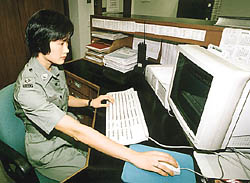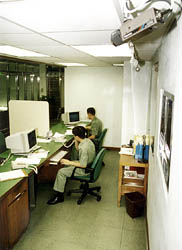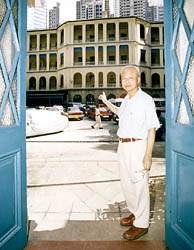



















| |
 Working with nametags and CCTV | Despite initial concerns of invasion of privacy and shades of an Orwellian "Big Brother", police officers at North Point Police Station are experiencing the benefits and advantages of wearing name tags and the installation of 24-hour closed circuit television - as part of the ongoing Customer Service Improvement Project launched in Eastern District at North Point Station in April this year . . . |
|
NORTH Point Police Station was chosen as the pilot station under the Customer Service Improvement Project to test new ideas and procedures that are at the frontline of police work and service quality to the community and, once proven and implemented, to create a benchmark for all police stations in the SAR to follow. So far the project has seen a series of measures being adopted in the station with the latest being the introduction of personalised name tags to be worn by all officers working in the premises. In addition, a 24-hour CCTV system in the report room allowing Duty Officers to monitor the reception area has also been installed. Measuring 7cm by 2cm, the clip-on silver-coloured plastic name tags display an officer's name in Chinese and English engraved in black. Initial reaction to wearing name tags was mixed with some officers preferring to remain a tad more anonymous. In order to protect the bearer's privacy, neither the officer's rank nor UI number is displayed. To date, practical usage and positive reaction from members of the community who come to the station to make a report has allayed officers' concerns. DPC Yan Wai-kin, who has been working in the North Point Police Station for four years, said: "The name tags are actually a good idea. They serve as a way to introduce police officers to members of the public and as a consequence we are often addressed by name in a much friendlier manner than before. The name tags also help to break down that invisible wall between the police and the public. We now are not just a number, but a name - a real person just like them. In turn, reportees feel more at ease and comfortable. Such a frame of mind is more conducive to giving a calm and accurate statement." Mr Yan's opinion is shared by Duty Officer WIP Carmen Tam who suggests, however, that the silver name tags are too shiny to be seen clearly and hoped that improvements could be made. A more contentious issue, initially, was the installation of CCTV cameras in the reception area of the report room with one focusing on its entrance and the other three on police officers manning the reception area as well as on members of the public making reports. Although unable to tape voices, the system can clearly record gestures and facial expressions of all people in the area. A notice placed prominently in the report room informs members of the public that they are being recorded on the CCTV while conducting their business with report room officers. | |
|
"Nobody has raised any objection to it so far," said Ms Tam. "In my opinion, people coming into the station to make reports behave in the same manner as they did before the installation of the device." The monitors are located in the office of the Duty Officer, who of course has better things to do with his or her time than to sit around surveilling the scene all day. "The reason behind the installation was to facilitate the Duty Officer in monitoring the reception area of the report room and to minimise incidents of unreasonable complaints and behaviour by members of the public if need be. The tapes could then provide next to irrefutable evidence in case an investigation is called for," explained WIP Tam. In addition, the system enables Duty Officers to get a better picture of the manning of the reception area and to deploy staff accordingly. |
 CCTV in the report room is there to help Ал not hinder |
|
"It must be said of course," said DPC Yan Wai-kin, who doesn't think closed circuit television will have any adverse effect on police officers' work, "CCTV also serves as a constant reminder to us to be patient and polite when dealing with the public. It makes officers behave reasonably, knowing not so much that they are being watched, but rather that what they do is being impartially recorded." Concludes Ms Tam: "Besides, report room officers will always treat the public well, with or without the CCTV. There's no such thing as officers being made to behave differently under the camera." Indeed, most officers have now come to disregard the camera as no different than CCTV systems deployed at banks or in other institutional and commercial buildings that deal directly with members of the community whose major function is to help provide taped information for investigative purposes should an emergency or any complaints arise. And in that respect, the CCTV is seen less as a Big Brother than as a guardian angel. | |
| Forty years of service to the Force | |
 Lee Kam-lun will miss the unique Hollywood Road station and his many friends there |
SENIOR Clerical Officer Lee Kam-lun
joined the civil service as a Temporary Clerk after completing Form Five in 1958,
attracted, like many other secondary school-leavers in the '50s, by a stable income. He
is currently working at the Central Police Station, and retires in mid-August after serving
the Force for 40 years. Where did the time go?
Looking back, Mr Lee says the years passed quickly, with the heavy workload in the Force leaving him no time to feel bored. He is well-known for his familiarity with the Central Police Station situated in Hollywood Road. Pointing at a black and white photo on the wall, he said: "In the early '60s, one of the big events in the station was the annual inspection during which the police commander would review the parade and check officers' kit in their quarters - just like the inspection held in the Police Training School. |
|
Adds Mr Lee: "Back then, the proportion of expatriate and local police officers was much different. When I first joined the Force, six of my seven bosses were expatriates." Mr Lee said his work has never been easy: "In the early days my duties were quite different from an ordinary clerk. They were similar to those of a Police Interpreter, a major task being to translate arrest reports, narrated by junior police officers, into English. Simultaneous translation was quite demanding for a young school-leaver like me, especially when handling 20 to 30 reports each day. But no formal training was given to me at that time." Lee Kam-lun also used to be the communication channel between expatriates and local junior police officers. When comparing his job as a clerk then with a clerical officer today Mr Lee concedes that the duties of clerical officers are now better defined with much more training provided. "Apart from day-to-day clerical duties, as a Senior Clerical Officer I have to oversee some functional duties as well," said Mr Lee, who has served in his present position since 1975. Having worked at the same police station for over 30 years, Mr Lee admits that it is hard for him to depart without feeling sad. Witnessing the changes in the station, he said: "Changes do not only apply to the qualifications of police officers and civilians - which are much, much higher now - but also to the more respectful relationships between senior and junior officers, as well as the public's attitude towards the civil service and the Government as a whole." Forty years in the Force have not only won Mr Lee a Long Service Award, but also made him a witness of the gradual change in the Central Police Station, leaving him with many precious memories. We hope Mr Lee enjoys every moment of his retirement. | |

![]()
